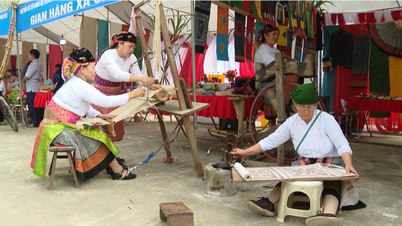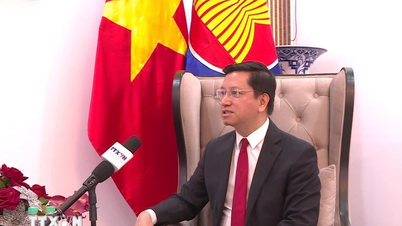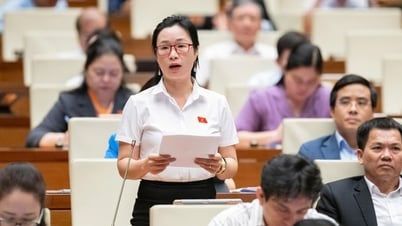According to the Ministry of Home Affairs, there should be a 1-1 assessment (only the user and the civil servant are assessed), avoiding the whole agency participating in the assessment, which will cause favoritism and formality.
The Ministry of Justice announced the appraisal dossier of the draft Law on Cadres and Civil Servants (amended) drafted by the Ministry of Home Affairs.
During the process of drafting the Law, the Ministry of Home Affairs referred to the experiences of several countries and made a number of recommendations for amending the Law on Cadres and Civil Servants of Vietnam, including the work of evaluating the work results of cadres and civil servants.

The Ministry of Home Affairs stated that in reality, in Vietnam, evaluation work is often formal, respectful, evasive, and not linked to salary and bonus treatment.
Therefore, it is necessary to consider amending the regulations on evaluating and classifying the work results of cadres and civil servants in the direction of building an objective, transparent, and substantive evaluation process, ensuring the quantification of work performance results, and increasing the authority of civil servants in the evaluation.
The Ministry of Home Affairs encourages 1-1 evaluation (in the evaluation session, only the user and the civil servant are evaluated), avoiding the participation of the entire agency in the evaluation, which will cause a state of deference, apprehension, formality and insubstantiality.
The drafting agency emphasized that the results of the assessment and classification of the level of work completion of cadres and civil servants must be the sole basis for carrying out the work of appointing, increasing salaries and rewarding cadres and civil servants.
Citing international experience, the Ministry of Home Affairs said that, except for China, which has many similarities with Vietnam, countries evaluate civil servants based on work performance, and the evaluation results are the basis for rewards as well as measures to improve and enhance the work efficiency of civil servants.
" Countries do not focus on evaluating difficult-to-quantify criteria such as political ideology, ethics, and lifestyle; if civil servants violate ethical rules or communication behavior, they will be disciplined... ", the Ministry of Home Affairs stated.
The method of evaluating civil servants in other countries is also different from that in Vietnam. In many countries, the authority and the civil servant sit in a separate room, the civil servant presents the results of his work and self-assesses the level of work completion.
The competent person will evaluate and make comments and find out the reasons why civil servants are not working effectively such as: health, family circumstances or lack of training and expertise to propose measures to support civil servants to solve their problems.
The Ministry of Home Affairs cited specific examples at In Japan , the performance of civil servants is periodically evaluated by the head of the government agency where the civil servant works. The procedures and record keeping for performance evaluation are separately regulated.
Japanese ministers decide to reward those who have excellent performance at work as well as apply sanctions to those who are weak.
In In the United States , each agency develops one or more performance appraisal systems to periodically assess the performance of its employees; encourages employees to participate in setting performance standards. The country uses performance appraisal results as a basis for training, rewarding, reassigning, promoting, demoting, retaining, and dismissing employees.
Each U.S. performance appraisal system includes: establishing performance standards that, to the maximum extent feasible, will permit accurate assessment of job performance on the basis of objective criteria relevant to the job in question for each employee or position in the system; informing each employee of the performance standards and the critical elements of the employee's position; evaluating each employee during the appraisal period against those standards; recognizing and rewarding employees whose performance is acceptable; assisting employees in improving unacceptable performance; and reassigning, demoting, or dismissing employees who continue to perform unacceptable (but only after being given an opportunity to demonstrate acceptable performance).
Employees with unacceptable performance will be given written notice by management and face the risk of being demoted or dismissed. If after 1 year the employee improves his/her performance, he/she will not be demoted or dismissed.
In In Australia , the head of the agency clearly states the requirements, standards, goals, and performance results for department heads - supervisors and employees. Agencies evaluate employee performance and the head of the agency recognizes the evaluation results.
Supervisors must have the ability to support employees to maximize their potential for the benefit of the organization. Employees must sign a commitment to perform the job and make efforts to fulfill this commitment. Supervisors and employees regularly discuss and find out difficulties, find the causes and come up with the best solutions to solve employee problems such as: knowledge gaps, health, skills, etc.
Supervisors must provide timely, fair, and objective feedback, fully documenting any significant performance concerns that are the basis for the evaluation. If an employee is rated unsatisfactory, the employee must sit down with the supervisor and human resources department to find a solution.
In In France , civil servants self-evaluate their work results and then send a report on their work results to the head of the agency. The head of the agency and the civil servant have a meeting to discuss, evaluate and agree on the evaluation results. If the civil servant does not agree with the evaluation opinion of the head of the agency, the civil servant can appeal to the Joint Administrative Committee to review the evaluation results...
Source: https://baolangson.vn/bo-noi-vu-tranh-tinh-trang-ca-co-quan-cung-tham-gia-danh-gia-can-bo-cong-chuc-5043640.html




































































































Comment (0)